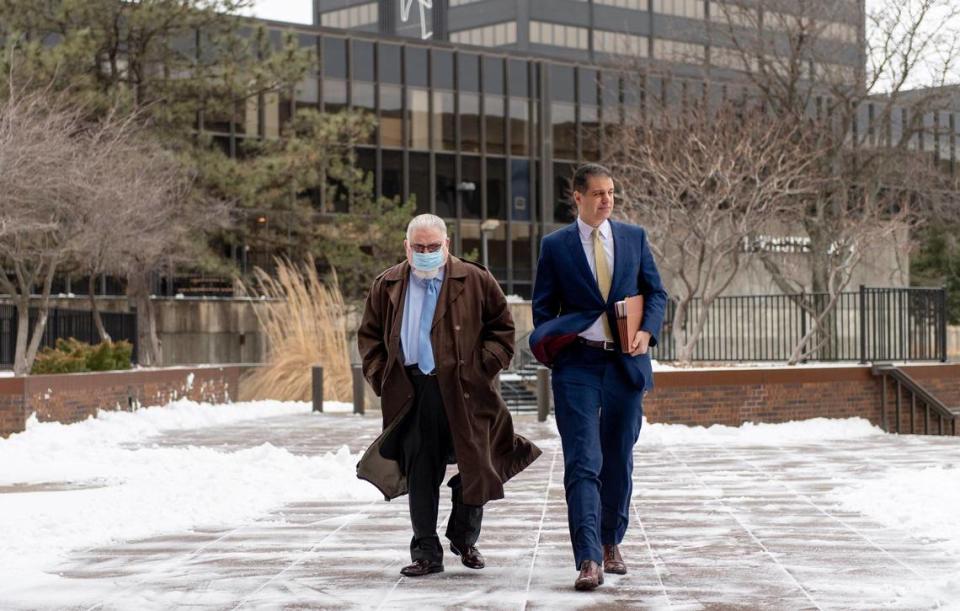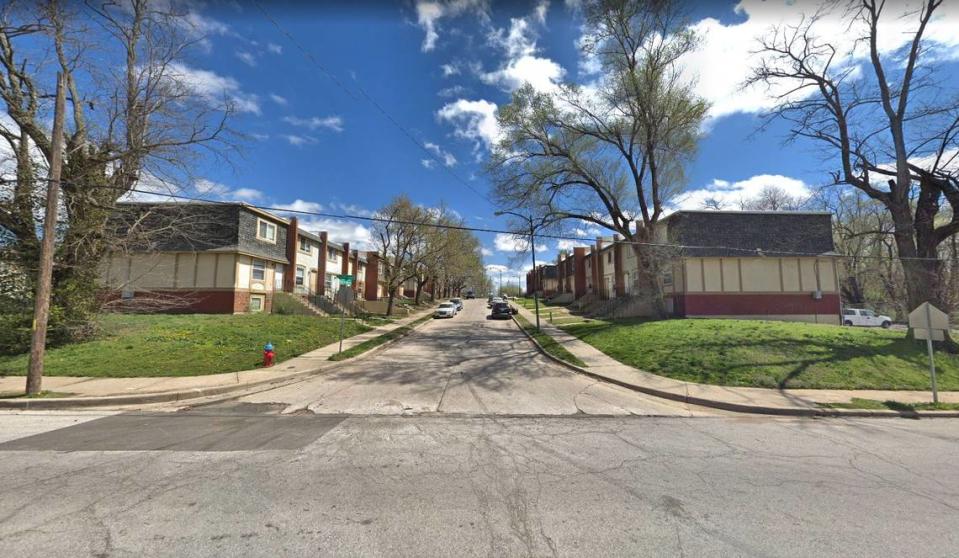Drug dealer charged with disgraced KCK cop Roger Golubski stays behind bars — for now
A federal magistrate on Monday gave a lawyer for Cecil Brooks, charged with running a sex trafficking operation in the 1990s with the alleged protection of a then-Kansas City, Kansas, police detective, more time to come up with a potential pre-trial release plan.
Brooks’ lawyer, Jonathan Truesdale, had filed a motion seeking his release ahead of the high-profile trial, but ultimately withdrew the request during a hearing Monday at the federal courthouse in Topeka. He asked for, and was granted, additional time to create a thorough pre-trial release plan before Magistrate Judge Rachel Schwartz decides whether to detain Brooks.
Brooks, 61, is accused of conspiring to sex traffic underage girls between 1996 and 1998 with three other men, including disgraced detective Roger Golubski, at an apartment complex Brooks operated in Kansas City, Kansas.
The girls, some of whom were recruited after they were released from a juvenile correctional center, were held “in a condition of involuntary sexual servitude” and used “like chattel,” prosecutors say. As a detective, Golubski allegedly protected Brooks and the others from police investigation as they trafficked and raped the girls at the apartments at Delavan Avenue and 26th Street.
When he was indicted alongside Golubski in November, Brooks was serving a federal prison sentence for trafficking cocaine. He finished that sentence in June and was moved to the custody of the U.S. Marshals Service.

Cecil Brooks seeks release
Truesdale, Brooks’ Kansas City-based lawyer, then filed the motion seeking his release, noting his co-defendants, including Golubski, have been granted pre-trial home detention. Truesdale also said Brooks was a model prisoner “with no record of any incident reports.”
“Based on the considerable age of the allegations in this matter and amount discovery involved in this case, it is not likely to proceed to trial soon,” Truesdale noted.
The U.S. Attorney’s Office in Kansas aggressively opposed Brooks’ request, calling him “violent and ruthless” and arguing that there was no way to ensure the safety of the community if he were released.
Alleged victims and “many of the government’s witnesses” live in fear of Brooks, who “lorded over” the dangerous drug and sex trafficking operation, federal prosecutors say. They argued Brooks would not hesitate to hurt or attempt to kill “anyone who might stand in his way” and pointed to a time when he allegedly paid for the silence of a man he kidnapped and tortured.
In that case, Brooks was charged in 1995 in Wyandotte County with aggravated kidnapping and battery. The victim, referred to in court records as D.M., set up a deal to buy a half a kilo of cocaine, with Brooks allegedly fronting the money. But D.M. was sold baking soda and could not pay Brooks back. D.M. was then “lured” into a basement and tortured for hours by Brooks and others, prosecutors said.
“D.M.’s arms and legs were bound, he was held at gunpoint, beaten over the head with a metal pan and possibly a gun, acid was poured on parts of his body, and pliers were used to snip his skin away from his body,” the U.S. Attorney’s Office wrote.
The victim was told Brooks would kill him if he reported the kidnapping, according to federal prosecutors.
But the victim apparently identified his assailants and charges were filed. While that case was pending, D.M. was shot three times outside a residence. He does not know who attacked him, but he believes it had something to do with Brooks.
State prosecutors dropped the kidnapping case against Brooks. Federal prosecutors now say that was because D.M., fearing for his life, agreed to a $5,000 payment “through a third party from” Brooks to not testify.
Additionally, prosecutors pointed Monday to Brooks’ “long history” of sex crimes. They noted that when Brooks was in his 20s, he got diversion in 1985 for a child sex crime. Brooks’ lawyer told the judge that Brooks was 18, while the victim was 15.
Prosecutors contend Brooks’ criminal history is “much worse than what is represented on paper.”
“It only reads this way because his enormous reputation for violence quelled those who would dare oppose him and his police protection made him nearly untouchable,” Assistant U.S. Attorney Stephen Hunting wrote in court filings.
Additional allegations revealed
More recently, prosecutors allege Brooks could not even remain law-abiding while on federal home confinement for a time during the COVID-19 pandemic. He is believed to have been granted release then because he is asthmatic.
The FBI learned of possible drug sales at the home where he stayed in the 1100 block of North 32nd Street in Kansas City, Kansas. Agents set up a pole camera, which prosecutors say revealed Brooks in “what appeared to be hand-to-hand drug transactions.”
In October 2021, agents executed a search warrant at the home, where they found a loaded handgun and a silencer in the bedroom where they were told Brooks stayed. His DNA was not on the gun; testing results on the silencer were not conclusive.
Brooks was sent back to federal prison after his GPS monitor “betrayed him,” Hunting said. Brooks was not charged, but the FBI, which also executed a search warrant on his phone, came to believe he was involved in selling cocaine while on house arrest.
Hunting revealed additional allegations against Brooks at Monday’s hearing.
One of Brooks’ enforcers told the FBI, for example, that Brooks once tried to smash someone’s hands with an iron, but the victim kept moving them, Hunting said. So Brooks allegedly shoved a gun up the person’s anus and warned him to stop moving his hands.
“I’m gonna blow your a— out,” Hunting quoted Brooks as saying.
Connection to Roger Golubski
Hunting also disclosed small pieces of information about the FBI’s investigation.
Evidence uncovered during the extensive probe, he said, showed that police were once called to the Delavan Apartments, where the alleged sex trafficking occurred. There, a woman in crisis pointed to Brooks’ office and expressed concern about violence against young girls. The cop who responded to the scene was told by someone there to “call Roger Golubski,” Hunting said.
“He knows all about it,” Hunting quoted the person as saying.
Golubski responded to the apartments, which cops and residents called “New Jack City,” a reference to a 1991 crime movie, because of the widespread criminal activity throughout the complex. Golubski told his fellow officer that it was all a misunderstanding, that the woman who spoke of abuse there was “crazy,” Hunting told the judge.

The judge wanted to know why Brooks should be detained while his co-defendants were released.
Hunting said the two co-defendants other than Golubski, men named LeMark Roberson and Richard “Bone” Robinson, were Brooks’ “lackeys.” Brooks, he said, was the head of the criminal enterprise and remains dangerous.
In a separate case, Golubski, now 70, also faces charges for allegedly sexually assaulting and kidnapping a woman and a teenage girl from 1998 to 2002. He was a veteran cop then, having worked at the Kansas City, Kansas, Police Department from 1975 to 2010.
Seated in the courtroom benches Monday was Kate Brubacher, who was sworn in as the U.S. attorney for the District of Kansas in March, signifying the importance of the case to the U.S Department of Justice.
Before the hearing, Brooks’ lawyer had come up with a potential seven-day pre-trial release plan for Brooks, but it was unclear where he would be living by day eight. That concerned the judge, who said she will take up the issue if Truesdale re-files the motion.
In court filings, Truesdale said Brooks planned to reside in Shawnee and work at a business owned by a relative if he were released. Another plan mentioned included Brooks staying with a nephew who has felony convictions.
After the hearing Truesdale said he will “vigorously defend” Brooks.
Brooks’ drug case
Brooks was sentenced to prison in 2009 for conspiring to distribute crack out of the apartment near Topeka High School, just blocks from the Kansas State Capitol and the federal courthouse where he appeared in a jail uniform Monday.
In that case, Brooks and his crew — which prosecutors called the “Brooks Drug Trafficking Organization” — were also alleged to have used a home in the 1900 block of North 24th Street in Kansas City, Kansas, to convert powder cocaine into crack.
During that investigation, a Brooks associate said the drug dealer hit him in the head with a beer bottle, knocking him to the floor, and burned his back with a hot iron because he thought he had lost or stolen $1,000 worth of crack.
Other community members have attested to Brooks’ violence, including one woman who has said she was with Brooks when he tortured a man “by sodomizing him with a broom handle.”
Some residents long believed Brooks paid off Golubski because the dealer could run with immunity, despite being a “kingpin” whose drugs also flowed into Johnson County, a retired Lenexa detective previously told The Star.
In their latest court filing, prosecutors alleged Golubski provided Brooks and the other men with “protection from law enforcement investigation and intervention into criminal offenses.”
No trial date has been set in the sex trafficking case. The men face life in prison if convicted.


